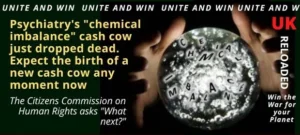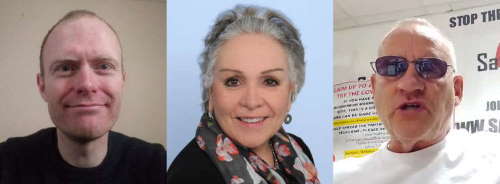Psychiatry’s “chemical imbalance” cash cow just dropped dead. Expect the birth of a new cash cow any moment now
Wed 9:46 am +00:00, 5 Oct 2022 1THE CITIZENS COMMISSION ON HUMAN RIGHTS ASKS “WHAT NEXT?”

Intro by Steve Cook
Joining it on the festering compost heap of dead conjobs are the pharmaceutical drugs foisted on the People under the pretext of “redressing” the non-existent balance.
The fondness of the mass poisoning enthusiasts for poleaxing innocent people with biochemical agents touted as remedies for fictitious “epidemics” ( viruses, depression etc) is now legendary, having been thrown into stark clarity by the debacle of the fake Covid plandemic.
That of course will not deter the psychopharmaceutical crime syndicate from pulling the same con again. Hence, we wait with baited breath to see what new pseudoscience is trotted out to terrorise people and thus help with the marketing of whatever new mega-profitable wheeze they come up with. Having had their cash cow drop dead they are going to want to birth a replacement pretty fast.
The following article from the ever-vigilant, ever courageous Citizens Commission on Human Rights (CCHR) UK derives from decades of experience as the leading psychiatric watchdog.
We would be wise to heed its advice and be prepared for the next psychopharmaceutical assault designed to debilitate the citizenry whilst raking in the spondoolies.
The ‘chemical imbalance’ bubble has burst. What’s next?
CCHR UK 16th August 2022
In the last few weeks, the mainstream media has come out in a full court press to debunk, or at the very least cast doubt on, the serotonin theory of depression. The notion of a ‘chemical imbalance in the brain’ has been given a wide berth by those who previously used it as a marketing tool. The media storm has directly invalidated the products of their highest revenue-generating client – Big Pharma.
The pile-on was something to behold: BBC News, The Times, Sky News, the Metro, Daily Mail, and the Guardian. And this is but a selection.
Especially disconcerting was they didn’t do the usual subtle job of escorting the delinquent products quietly out of the building. The journalists went straight for the jugular and in so doing, saw the chemical imbalance theory of depression falter and die along with the purported function and purpose of SSRI drugs.
In other words, a person could continue taking SSRIs if they think they are working, but they are not doing what they were intended to do. As an example, Aspirin thins the blood – that is at least one of its actions, and it is a mechanism that is well understood. SSRIs may be doing something, but they are not redressing a chemical imbalance.
This verdict – though long known to many – could not have come sooner for those at CCHR. However, the fact that it was brought to the fore by so many mainstream outlets – all at the same time – when all of them, one for one, are funded, through vast amounts of advertising funds by the very companies whose products they have invalidated, begs the question: what is going on?
In 2020, the pharmaceutical industry spent 4.58 billion U.S. dollars on advertising on national TV in the United States… In 2020 TV ad spending of the pharma industry accounted for 75 percent of the total ad spend.
Are we meant to believe that the mainstream media would renounce 75% of their ad revenue because scientists from University College London published a scientific paper – an umbrella review of SSRIs – that seems to hold water? Did something change, collectively, in the upper management strata of mainstream media organisations? Did they all suddenly grow a conscience?
Unlikely. It makes no business sense, and for Big Pharma and Big Media alike, business is business.
Rather than a good faith take-down of SSRIs, are we not in fact bearing witness to the strategic slaughter of one of Big Pharma’s all time greatest cash cows, the SSRI antidepressant?
Let’s begin by looking at 7 of the 8 SSRIs prescribed by the NHS.
| Chemical name | Brand name | Expiration of patent |
| Fluoxetine | Prozac (Eli Lilly) | 2001 |
| Citalopram | Celexa (Lundbeck) | 2003 |
| Sertraline | Zoloft (Pfizer) | 2006 |
| Paroxetine | Seroxat (GlaxoSmithKline) | 2003 |
| Vortioxetine | Brintellix (Takeda) | 2027 |
| Escitalopram | Cipralex (Lundbeck) | 2009 |
| Fluvoxamine | Faverin (Solvay) | 2000 |
This first thing that strikes the eye is that their respective patents – with the exception of Vortioxetine produced by Japan’s Takeda – all expired more than 15 years ago, meaning Big Pharma’s SSRI profits became fair game for any generics manufacturer with deep enough pockets to build out a supply chain.
What is the impact of a patent expiration on the profitability of a product? Here’s a snippet: Lilly’s patent [for Prozac] expired in August 2001… generic drug competition decreased Lilly’s sales of fluoxetine by 70% within two months.
Anything above a 50% loss of revenue is a debilitating blow. Surely, similar losses must have been suffered by the other companies cited above when their patents expired.
It takes 10-15 years to bring a new drug to market. So perhaps, before introducing whatever novelty they have up their sleeve, Big Pharma first needed to clear the deck, so as to be in the best position to market new wares when these are ready (and approved). Clearing the deck means removing what is currently there, or to be perfectly explicit: removing SSRIs so that they can be replaced by newly patented products. This is just speculation, but there must be a reason for the concerted about-turn by Big Media after more than 20-30 years of unwavering loyalty.
Enter psychedelics
On March 5, 2019, the Food and Drug Administration (FDA) approved the first new medication for major depression in decades. The drug is a nasal spray called esketamine, derived from ketamine—an anaesthetic that has made waves for its surprising antidepressant effect.
This is worth repeating: the Food and Drug Administration (FDA) approved the first new medication for major depression in decades. The application was made in 2018 by Johnson & Johnson.
As it’s the derivative, what then is ketamine? This is from the DEA’s own website:
Ketamine is a dissociative anaesthetic that has some hallucinogenic effects. It distorts perceptions of sight and sound and makes the user feel disconnected and not in control. It is an injectable, short-acting anaesthetic for use in humans and animals. It is referred to as a “dissociative anaesthetic” because it makes patients feel detached from their pain and environment.
Ketamine can induce a state of sedation (feeling calm and relaxed), immobility, relief from pain, and amnesia (no memory of events while under the influence of the drug). It is abused for its ability to produce dissociative sensations and hallucinations. Ketamine has also been used to facilitate sexual assault.
In short, ketamine is an anaesthetic with hallucinogenic effects, often used as a recreational drug.
What is a psychedelic? From the Oxford dictionary: relating to or denoting drugs (especially LSD) that produce hallucinations and apparent expansion of consciousness.
Even though the word is not used, ketamine is basically a psychedelic, or at least very much an adjacent drug.
Is this just a one off? Well, there’s more, and this time the drug of choice is the magic mushroom: In a landmark exploratory trial published in the New England Journal of Medicine earlier this year, psilocybin was compared with the widely used antidepressant escitalopram. Although not powered to detect a difference between the drugs, a number of positive findings—levels of response and remission of symptoms—were more common in psilocybin-treated individuals. This has sparked renewed interest in psychedelic therapies as another avenue of drug discovery.
And right here in London, the Evening Standard reported: Inside London’s first psychedelic psychotherapy clinic. Psychedelics are being touted as a cure for depression, addiction and many other common mental health disorders… In 2018, psilocybin — the active ingredient in magic mushrooms — was given ‘breakthrough therapy status’ by the US Food and Drug Administration (FDA), when used as a treatment for depression.
It’s worth repeating this one as well: In 2018, psilocybin — the active ingredient in magic mushrooms — was given ‘breakthrough therapy status’ by the US Food and Drug Administration (FDA), when used as a treatment for depression.
Where then are we heading? Is Big Pharma clearing the deck to introduce its “new and improved” set of patented drugs for another 20 years of high profits? Will the NHS soon be touting not 8 SSRIs, but as many psychedelics in their stead?
Only time will tell. But only one thing is certain, something is definitely going on. SSRIs lost their “royal favour” almost overnight. If they are removed entirely, the void will need to be filled. And when that time comes, as all good marketeers know, one should best be ready, with new products in hand, and a good story with which to sell them.











Not surprising Weaver, psychiatry like magic is mainly an occupation of “God’s chosen!”